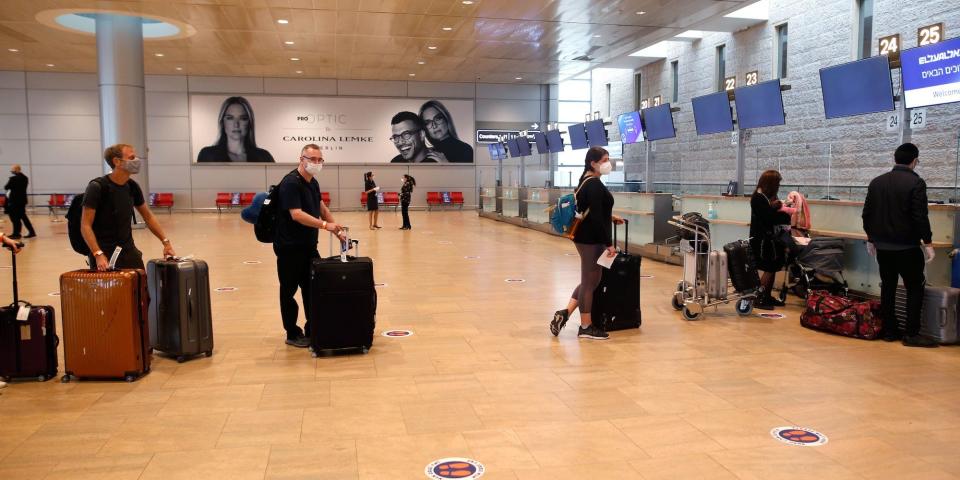A study looking at the coronavirus genome in Israel found that 70% of the virus transmission in the country could be linked to the US
Seventy percent of coronavirus cases in Israel could be linked to the US, according to a new study on the virus' genome.
The study, which has yet to be peer-reviewed, compared the sequence of the virus from more than 200 randomly selected patients and compared them to sequences of the virus found worldwide, The New York Times reported.
Israel shut down travel from European countries starting on February 26 but did not impose those measures for US travel until March 9.
Researchers said that had the measures been applied to the US sooner, the number of cases in the country would be significantly lower.

Passengers wait to check in while keeping social distance in Ben Gurion International Airport near Tel Aviv, on May 14, 2020.
Gil Cohen Magen/Xinhua via Getty
While only 27% of US travelers to Israel tested positive for the coronavirus, a new study found that travel from the United States alone could account for 70% of coronavirus cases in the country, The New York Times reported.
A genome study from Tel Aviv University sequenced the genomes of virus samples from more than 200 randomly selected patients across six hospitals and compared them to sequences worldwide. The study has not yet been peer-reviewed.
According to the Jerusalem Post, while flights from some European and other countries began to be halted starting on February 26, those from the US were not suspended until March 9.
"Those who returned from the US created transmission chains," Adi Stern, from the School of Molecular Cell Biology and Biotechnology at TAU's George S. Wise Faculty of Life Sciences, told The Jerusalem Post.
As of Tuesday, Israel had 16,659 confirmed coronavirus cases and 278 deaths.
The study said that if the country had banned travelers from the US when it banned other countries, "a substantial fraction of the transmission chains in Israel would have been prevented," The Times reported.
"There was this gap in policy, and this gap allowed people to return from the US who thought that they could go wherever they wanted, so they probably spread the virus that way," Stern told the Post.
According to the Post, Israeli Prime Minister Benjamin Netanyahu decided to close the country's borders to all countries, including to the US on March 8 after a conference call with Vice President Mike Pence.
The study also said that closing the country off from tourists, enforcing social-distancing rules, and imposing a lockdown on citizens, appears to have cut the transmission rate in the country by two-thirds.
However, it did also find that superspreaders appeared to have an important role in the spread: 5% of patients were thought to be responsible for the spread of the virus to 80% of everyone infected, according to The Times.
Read the original article on Business Insider

